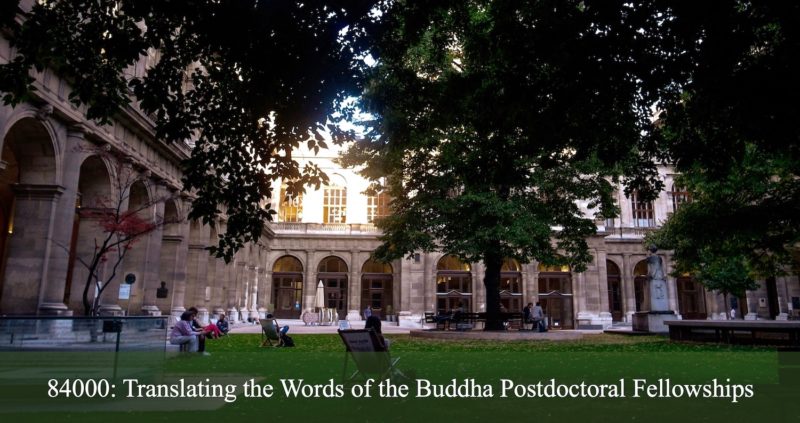84000: Translating the Words of the Buddha Postdoctoral Fellowships
We are pleased to invite applications for two one-year full-time (portable) postdoctoral fellowships, for the purpose of translating one or more texts from the Tibetan Kangyur into English.

NOTE: Interested applicants are strongly encouraged to contact grants@84000.co for preliminary discussion of text(s) selection before preparing their application.
The translations (of up to 150-200 Tibetan pages in total per person) will subsequently be published online in the 84000 Reading Room.
Fellowship details
- Annual stipend: 50,000 USD
- The fellowship period begins on August 1, 2022 (or as arranged with 84000) and lasts one year. No other employment is permitted during the fellowship tenure, and the fellowship may not be held concurrently with other fellowships and grants.
- Completed applications must be submitted by email to grants@84000.co no later than March 1, 2022.
- Notifications to applicants will be sent via email by May 1, 2022.
Eligibility
- Applicants must hold a PhD in Buddhist Studies, or a closely related field, officially conferred by an accredited university between January 1, 2017 and January 1, 2022.
- 84000 welcomes proposals from applicants without restrictions as to citizenship, country of residence, and proposed work location.
- A fellowship-in-residence may be proposed at any university or college, including the institution that granted the applicant’s PhD and the institution of current employment.
- The applicant must submit a letter from the proposed host university confirming its willingness to host the applicant for a one-year postdoctoral fellowship-in-residence. If travel restrictions due to the current pandemic are still in place by August 2022, the postdoctoral position may be virtual.
Application requirements
Applications must be written in English and include the following elements:
- Proposal (no more than 3 pages) including the following subsections:
- Project description, including the title, Tohoku number, and location in the Degé Kangyur of the text(s) you propose to translate, as well as a rationale for the proposed choice of text(s).
NOTE: Please check the status of the text in the 84000 Reading Room, to avoid applying for a text that has already been translated or commissioned.
- Presentation of methodology and work plan, including relevant source texts, their bibliographical locations, existing scholarly works in the field, and how you plan to use such publications in your own work.
NOTE: Please read 84000’s guidelines for translators: [G4] 84000 Guidelines for Translators, [G5] Text Critical Guidelines for 84000 Translators and [G6] 84000 Guidelines – Checklist to learn about the standards to which you must prepare your translation and additional ancillary materials such as translators’ introductions, glossaries, etc. that you will be required to submit as part of your work. It is also recommended that you study the format and style of the translations that have been published in the 84000 Reading Room.
- Translation sample of 3 Tibetan pages:
- Please do not translate as your sample the first three pages of the text, as these are usually formulaic, but choose instead a representative passage from the body of the text that includes varied content and syntactic structures, if possible. Avoid simple lists or purely repetitive passages.
- Supplement your 3-page translation with glossaries etc., to approach as closely as possible the Guidelines for Translators, Text Critical Guidelines and Checklist, as well as the completed translations posted online in the 84000 Reading Room.
- Copies of the original Tibetan text from which your sample was translated
- Curriculum Vitae
- PhD transcript showing all PhD courses taken, final grades for each course, and date of award of the PhD degree
- Host commitment letter
- Two reference letters
- If possible, please collect all the application elements into one PDF file for ease of tracking and review.
Selection criteria
- Mastery of relevant source languages
- Prior practical experience translating Buddhist literature
- The quality of the translation sample
- The quality of the proposal with regard to its methodology, theoretical framework, and grounding in the relevant scholarly literature
- Feasibility of the proposed work plan
- The applicant’s record of previous accomplishments
- Compatibility of the applicant with the proposed host university.
Note to potential host institutions
The applicant must request a letter of support from the host institution where the applicant plans to spend the one-year fellowship period. Please note that, as a non-profit organization, 84000: Translating the Words of the Buddha is not able to provide the host institution with funds for overhead costs. Applicants must therefore have prior approval of this from the host institution.
Posted: 9 Apr 2021
